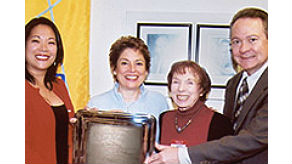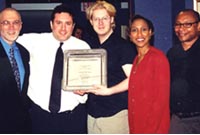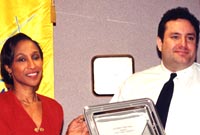It is with great pride and joy that we acknowledged two theatres this year with the Rosetta LeNoire Award for "excellence in artistic contributions to the universality of the human spirit." Awards were presented at membership meetings in Los Angeles and New York on April 4, 2003 to Deaf West Theatre of Los Angeles and North Shore Music Theatre of Beverly, Massachusetts. Here are profiles of the two recipients.
Deaf West Theatre

Deaf West Theatre is the only professional resident Sign Language theatre west of the Mississippi. Founded in 1991 by Ed Waterstreet to "directly improve and enrich the cultural lives of the 1.2 million deaf and hard of hearing individuals who live in the greater Los Angeles area," DWT has given extraordinary opportunities for both deaf and hearing audiences to share a legacy of deaf culture. Recently, they experienced a ground-breaking commercial success, as well, when their production of Big River moved to the prestigious Mark Taper Forum and garnered 11 Ovation Award nominations and six wins, including one for Best Musical. It is the first time in the Taper's 35-year history that a production from an "intimate" theatre (in LA, a 99-seat theatre) has been transferred.
Deaf West produces one production per year--from classics, contemporary and original plays to musicals. All are cast with both deaf and hearing actors and incorporate American Sign Language (ASL) simultaneously with spoken English. At the resident theatre, audiences historically have been 75% hearing and 25% deaf. Techniques such as state-of-the-art lighting (to assure that signers are properly lit) and subwoofers under the seats (to allow deaf audience members to feel the vibrations from low frequency sound effects) add to greater accessibility for both audiences. Video monitors backstage let deaf actors watch what's happening on stage in order to get their entrance cues. Founding member Linda Bove describes all of this as "taking advantage of every design element in the theatre."
Working hand-in-hand with a team of ASL masters (three deaf and one hearing), the hearing actors receive individual translation work, learning to sign the text line by line and how to communicate in a way that's compatible to the deaf actors. The masters give the cast information on the culture and how to approach this challenging rehearsal process. They also work with the deaf actors to make sure that a strict, intricate translation from English to ASL is adhered to.
Subtitles also have been used, as in a recent production of True West. Providing captions to describe background and sound effects, the subtitles were also used to illuminate the English text of characters that were portrayed as deaf, as character devices. In Big River, no subtitles were used, but many characters were portrayed by two actors: one as the voice, and one as the signer. The effect was dramatic and mesmerizing, adding a unique depth to the text.
This non-profit theatre also takes part in community initiatives, with funding from the U.S. Department of Education, such as bringing programming to underserved populations in the area, in-school workshops, summer programs for children and exporting their unique brand of theatre to other areas of the country. Ms. Bove (who is the Summer School Director) speaks about her own limited access to the arts as a deaf child and Deaf West's commitment to filling that void for students today. Their workshops integrate deaf and hearing students, bringing professionals to teach exercises illuminating how they create theatre and story translations. Many times these programs provide rare role models for the deaf students and impact hearing students' understanding and perceptions about deaf people's ability to communicate. Through these workshops, Ms. Bove says, as the students become fascinated with ASL and start to understand one another more, a pride in the culture, community and language is instilled.
Deaf West aims to become a part of mainstream theatre, viewing itself not for deaf people only, but as a theatre creating quality product, breaking barriers and increasing exposure to a unique culture. As Deaf West continues to have an impact on the media, they are also hopeful that other theatres will get the idea from this multi-award winning success story that integrating signing actors can enhance their own story-telling, as well.
For more information on Deaf West Theatre, visit their website at www.deafwest.org.
North Shore Music Theatre

North Shore Music Theatre, New England's largest non-profit theatre, is among the top ten subscription houses in the country. Committed to "the evolution of musical theatre," they believe that "musical theatre combines primal concepts of music and storytelling. It is uniquely American, emotional, ageless and a celebration of the human spirit. Furthermore, musical theatre is dynamic and evolving, always stretching its boundaries and challenging perception." In addition to producing six musicals per year, a celebrity concert series, a Theatre for Young Audiences performance program, and an annual production of A Christmas Carol, North Shore has assisted in the development of 20 new musicals and produced several regional, national and world premieres over the past 16 years.
They are also a testament to promoting diversity through programming as well as non-traditional casting. In describing the upcoming season, Artistic Director and Executive Producer Jon Kimbell said that they "searched for stories that will change the way our audiences look at the world. We wanted stories that will open your mind as well as your heart. The result is a season that draws its strength from diversity--diversity in the nature and content of our shows, in the actors and other professionals bringing them to life, and in the audiences to which they are designed to appeal."

o that end, North Shore will offer its 24,000 subscribers a season that includes stories of a flamboyant socialite's adventures, 19th Century Japan, the birth of Rock and Roll, the music of Lieber and Stoller, a classic love story at odds with racism and felines in a junk yard. (In other words, MAME, PACIFIC OVERTURES, a world premiere of MEMPHIS, SMOKEY JOE'S CAFE, WEST SIDE STORY and CATS.)
North Shore has demonstrated a bold commitment to non-traditional casting. Some examples include Kimla Beasley as "Philia" in A Funny Thing Happened on the Way to the Forum, Riccardo Pitts Wiley as "Claudius" in Hamlet, Janelle Robinson as "Nettie Fowler" in Carousel, Josh Tower as "Joseph" in Joseph and the Amazing Technicolor Dreamcoat, Enrico Rodriguez and Christine Toy Johnson as "Ren and Ethel McCormack" in Footloose and Ken Prymus as "The Wizard" in The Wizard of Oz.
North Shore also contributes to educating the community through their After-School Drama Enrichment Program, Theatre for Young Audiences school touring programs and year-round classes for children, which reach 100,000 New England School children each year.
North Shore Music Theatre has 1,800 seats in-the-round, and operates under an Equity COST Tier 3 Contract. For more information, you can visit their website, www.nsmt.org
